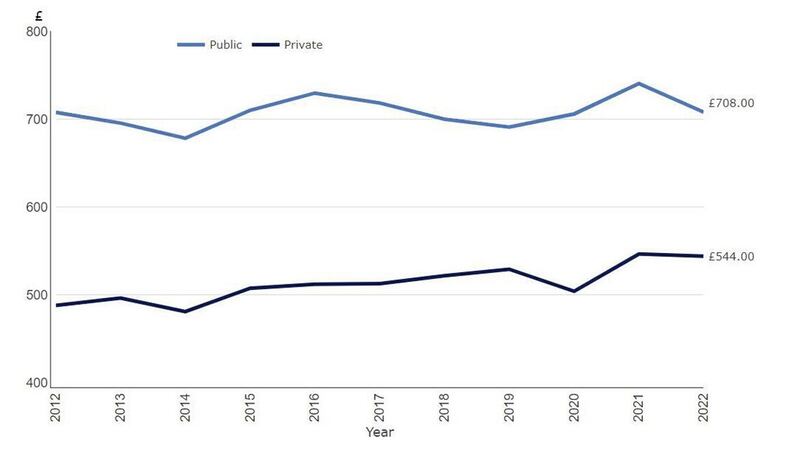REAL weekly earnings in the north fell by a record 4.5 per cent in the year to April 2022, new official figures show.
The Annual Survey for Hours and Earnings (ASHE) said the median gross weekly earning for full-time workers in April stood at £592, an increase of 2.9 per cent on April 2021.
But when inflation was factored in, the average real weekly wage actually fell by around £28 a week.
The report by the Northern Ireland Statistics and Research Agency (Nisra) said there had been no growth in real earnings for public sector workers over the last decade.
Real earnings for private sector workers have grown by 11 per cent since 2012.
But the survey put median gross weekly earnings for full-time public sector workers at £708 in April 2022, well above the £544 for full-time private sector workers.

The report found that real earnings had decreased in 12 of 17 industries in the north over the year to April.
The sharpest drop (16 per cent) was in the accommodation and food service sector.
By contrast those employed in ‘professional, scientific and technical activities’ saw an 8.9 per cent increase over the same period.
Research published by the UK’s Centre for Economics and Business Research (Cebr) on Tuesday suggested the spending power of the average household in Northern Ireland had contracted by 28.7 per cent in a year.
Cebr said that the average family here was left with only £95.10 per week to spend on discretionary goods and services in the third quarter of 2022, significantly below the UK average of £209.
READ MORE: Study: NI households experience record drop in spending power
Nisra’s report said the record contraction in wages over the year to April followed record increases in 2021.
The survey found that the proportion of low-paid jobs in Northern Ireland fell over the year to a record low (13 per cent), continuing the trend since the introduction of the National Living Wage in 2016.
But, despite the improvement, Nisra said the north still had the third highest proportion of low-paid jobs all UK regions in 2022.
Meanwhile, Nisra said the gender pay gap for all employees in Northern Ireland, regardless of working patterns, was 8.4 per cent in favour of men, up from 4.7 per cent over the year.
The statistics body said females in the UK have earned around 15 per cent less than males on average between 2020 and 2022.
But in the same report, Nisra said Northern Ireland is the only region of the UK where full-time females earn more per hour on average than full-time males.
Full-time female workers earned 4.6 per cent more than full-time men. That compared to the UK as a whole, where women earned 8.3 per cent less per hour than males.
Nisra said the variation in the gap for full-time and all workers is down to the higher proportion of female part-time workers here and the number of women in full-time employment within the public sector.
The median full-time annual salary in Northern Ireland, which is calculated differently from weekly earnings, stood at £30,000 in April, 3.2 per cent higher than 2021, but below the UK median of £33,000.
Nisra said an annual salary of £54,500 or above would put a worker in the highest 10 per cent of earners here.



